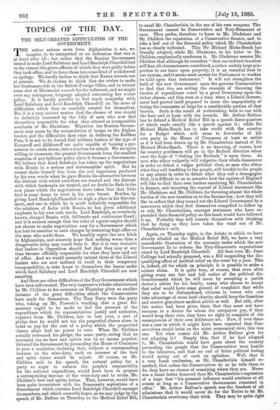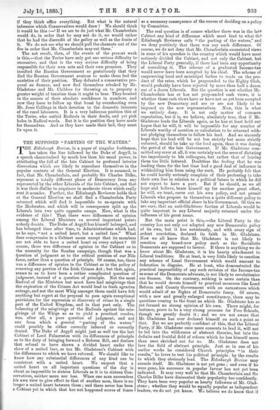TOPICS OF THE DAY.
THE SELF-CREATED DIFFICULTIES OF THE GOVERNMENT.
THE rather serious news from Afghanistan is not, we imagine, to be interpreted as an indication that war is at hand after all ; but rather that the Russian Government intend to make Lord Salisbury and Lord Randolph Churchill feel to the utmost the grave offence of which they were guilty before they took office, and to force them into some kind of withdrawal or apology. We hardly incline to think that Russia intends war at present. We do incline to think that she wishes to make her displeasure felt in the British Foreign Office, and to extract some sort of Ministerial amende for the indiscreet, and we might even say outrageous, language adopted concerning her recent policy. It is hardly possible to feel much sympathy with Lord Salisbury and Lord Randolph Churchill on the score of difficulties which they so carefully created for themselves. But it is a very serious matter that the chance of war should be definitely increased by the folly of men who now find themselves responsible for what they uttered as irresponsible assailants of Mr. Gladstone. Whatever the Russian Govern- ment may mean by the accumulation of troops on the Afghan border, and the difficulties they raise in defining the Zulflkar Pass, it is not to be denied that military leaders of the type of Komaroff and Alikhanoff are quite capable of turning a per- mission to create alarm, into a sanction for attack. We are quite willing to exonerate the present Government from the smallest suspicion of any bellicose policy since it became a Government. We believe that Lord Salisbury has taken up the negotiations with Russia in a serious and statesmanlike spirit. But he cannot shake himself free from the evil impression produced by his own words when he gave Russia the alternative between the distrust with which swindlers are treated and the distrust with which bankrupts are treated, and no doubt he finds in the new phase which the negotiations have taken that that little bird is come home to roost in his own breast. Besides, by giving Lord Randolph Churchill so high a place in his Govern- ment, and one in which he is made indirectly responsible for the relations of India with Russia, he has given additional emphasis to his own rash words. Lord Randolph, as everybody knows, charged Russia with deliberate and continuous fraud ; and it is natural enough that the ruler of a great empire should not choose to make negotiations easy for a Government which has lent its sanction to such charges by bestowing high office on the man who made them. We heartily regret the new hitch in Afghanistan, and sincerely hope that nothing worse than a disagreeable delay may result from it. But it is very desirable that leaders in Opposition should feel that they may at any time become officially responsible for what they have said out of office. And we would earnestly entreat those of the Liberal leaders who are now inclined to exult in their temporary irresponsibility, to take home to themselves the lesson under which Lord Salisbury and Lord Randolph Churchill are now smarting.
And there are other difficulties of the Tory Government which have been self-created. The very impressive rebuke administered by Mr. Childers to his successor on Thursday gives us another instance of the great difficulties which the Conservatives have made for themselves. The Tory Party were the party who, taking up Mr. Fawcett's teaching that a great De- mocracy ought to be made to feel the pressure of the expenditure which its representatives justify and authorise, required from Mr. Childers, late in last year, a sort of pledge that he would not tax the propertied classes alone in order to "pay for the cost of a policy which the propertied classes alone had no power to veto. When Mr. Childers actually redeemed his pledge, the same party, seeing that an increased tax on beer and spirits was by no means popular, defeated the Government by persuading the House of Commons to pass a resolution declaring that, without a corresponding increase on the wine-duty, such an increase of the beer and spirit duties would be unjust. Of course, as Mr. Childers said in his speech, the natural policy for a party so eager to enforce the people's responsibility for the national expenditure, would have been to propose a corresponding increase of the wine-duty and to retain Mr. Childers's beer and spirits duties. That, however, would have been quite inconsistent with the Democratic aspirations of a Government which contains Lord Randolph Churchill amongst its members, and which earnestly hopes, as we may judge by the speech of Mr. Balfour on Thursday on the Medical Relief Bill, to excel Mr. Chamberlain in the use of his own weapons. The Government cannot be Conservative and Tory-Democrat at once. They prefer, therefore, to leave to Mr. Gladstone and Mr. Childers the reputation of a Conservative finance, and to take a leaf out of the financial policy which Mr. Chamberlain
has so clearly indicated. This Sir Michael Hicks-Beach has literally adopted, while Mr. Gladstone, in his letter to Mr. Childers, emphatically condemns it. Mr. Gladstone assures Mr. Childers that although he considers "that our indirect taxation still has, all circumstances considered, a rather unduly large pro- portion to our taxes upon property, it is an essential item in our system, and it seems most unwise for Parliament to weaken its hold upon that instrument." It will not strengthen the hold of the new Government upon the genuine Conservatives to find that they are setting the example of throwing the burden of expenditure voted by a great Democracy upon the richer classes, and this even at a time when a Liberal Govern- ment had proved itself prepared to incur the unpopularity of taxing the consumers at large for a considerable portion of that burden. Such is the result of undertaking both to run with the hare and to hunt with the hounds. Mr. Arthur Balfour has to defend a Medical Relief Bill in a speech three-quarters of which reads exactly like a speech against it ; while Sir Michael Hicks-Beach has to take credit with the country for a Budget which will seem to five-sixths of his own party in the House of Commons at least as unfair as if it had been drawn up by Mr. Chamberlain instead of Sir Michael Hicks-Beach. There is no knowing, of course, how far country gentlemen will go in the Radical direction whea once the hope of "dishing the Radicals" is upon them. As men who abhor vulgarity will vulgarise their whole demeanour in order to defeat a vulgar political rival, so men who abhor what they call truckling to the people, will truckle to the people to any extent in order to defeat what they call a demagogue. Still, it is difficult to us to conceive how the squires of England will like to find their own leaders emulating Mr. Chamberlain in finance, and incurring the reproof of Liberal statesmen like Mr. Gladstone and Mr. Childers, for throwing almost the whole burden of the new taxation on to the Income-tax ; how they will like to reflect that they turned out the Liberal Government by a manosuvre which they find themselves compelled to follow up as only Mr. Chamberlain, amongst statesmen who have ex- pounded their financial policy on this head, would have followed it up. Probably they will console themselves with thinking that by doing so they have taken the wind out of Mr.. Chamberlain's sails.
Again, on Thursday night, in the debate to which we have already alluded on the Medical Relief Bill, we have a very- remarkable illustration of the necessity under which the new Government lie to redeem the Tory-Democratic expectations raised by Lord Randolph Churchill. All that even Mr. Jesse Collings had actually proposed, was a Bill suspending the dis- qualifying effect of medical relief on the voter for a year. This is, indeed, all for which on principle it is possible to make a serious claim. It is quite true, of course, that even after giving every one fair and full notice of the political dis- franchisement which he will incur by accepting a parish doctor's advice for his family, many who choose to accept that relief would have some ground of complaint that while they are to be disfranchised, citizens in towns who can take advantage of some local charity, should keep the franchise and receive gratuitous medical advice as well. But still, after fair notice had been given them that they must not have recourse to a doctor for whom the ratepayers pay, if they would keep their vote, they have no right to complain of the consequences of their own deliberate act. Now, if ever there was a case in which it might have been expected that Con- servatives would insist on the strict economical view, this was one. Yet what reason did Mr. Arthur Balfour give for not adopting it ? Simply this, that if he ' had adopted it, Mr. Chamberlain would have gone about the country persuading the people that the Conservatives were hostile to the labourers, and that no end of bitter political feeling would spring out of such an agitation. Well, that is a very frank confession, as Mr. Chamberlain himself re- marked, that unless the Conservatives do as he tells them to do, they have no chance of remaining where they are. Never was a taunt better deserved than Mr. Chamberlain's expression of a hope that "his personal influence would continue at all events as long as a Conservative Government remained in office." Mr. Arthur Balfour's speech was the frankest of all admissions that it would never do for the Tories to let Mr. Chamberlain overtrump their trick. They may be quite right if they think office everything. But what is the natural inference which Conservatives would draw ? We should think it would be this If we are to do just what Mr. Chamberlain would do, in order that he may not do it, we would rather that he had the discredit of the policy as well as the fruits of it. We do not see why we should pull the chesnuts out of the fire in order that Mr. Chamberlain may eat them.'
The net result, then, of the events of the present week is this,—that the Tories have only got one serious difficulty to encounter, and that is the very serious difficulty of being responsible for their own acts and their own promises. They insulted the Russian Government so gratuitously that they find the Russian Government anxious to make them feel the anxieties of their position. They defeated a conservative pro- posal on finance, and now find themselves rebuked by Mr. Gladstone and Mr. Childers for throwing on to property a greater weight of taxation than it ought to bear. They boasted to the masses of their absolute confidence in numbers, and now they have to follow up that boast by overshooting even Mr. Jesse Collings in their devotion to the domestic interests of the rural labourers. It is a very ludicrous position this of the Tories, who outbid Radicals in their deeds, and yet pick holes in Radical words. But it is the position they have made for themselves. And as they have made their bed, they must lie upon it.



































 Previous page
Previous page